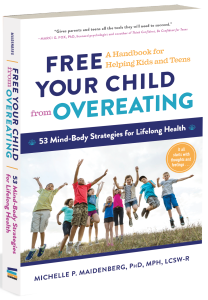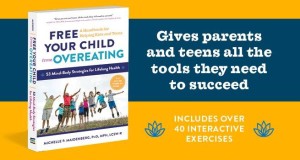If your child struggles with overeating, then you know exactly how difficult it can be to overcome. Sure, we have access to more dietetic information than ever before, but healthy eating isn’t just about counting calories and sticking to greens: maintaining a positive diet also requires that we overcome the psychic barriers that block us from making the right decisions.
That’s why we’re so pleased to announce that Free Your Child from Overeating: 53 Mind-Body Strategies for Lifelong Health publishes today! Brimming with strategies and mindful exercises for both parent and child, Free Your Child from Overeating offers healthy eating advice where it counts the most: at the interface of the mind and the body. From “I aced the test—I deserve a treat!” to “I failed the test, I’ll cheer up with a treat,” this title helps determine and understand the reasoning behind excuse after excuse, all while dolling out practical tools to productively wash them away.
Author Michelle P. Maidenberg, PhD, MPH, LCSW-R understands the stress of childhood overeating. With years of impassioned experience and steady-handed practice under her belt, Maidenberg has seen it all. She knows that overeating is a challenging subject to discuss with children, especially if the goal is to lift their self-image. Inspiring introspection, her mindfulness approach will help readers distill the psychology underlying unhealthy eating patterns and allow parents to approach and work with their children with an air of understanding.
Below, we have included one of Maidenberg’s 53 strategies as an preview of the help offered in this book. Combining psychological insight with mindfulness lessons and practical advice, these segments build a rich toolbox to help a child or teen work their way to a healthy diet.
CREATE SPACE
Process Thoughts and Actions with Purpose
Most individuals I work with report that when they overeat, they go from “zero to ten” automatically and don’t usually remember having any thoughts in between experiencing the urge (“I want this food”) and the doing (eating the food). They express that it just happens. During and after the incident, they are typically left feeling angry and frustrated. They experience shame and self-loathing because, from their perspective, they couldn’t be more mindful and control their behavior. We have all been there. Space needs to be created so that we can thoughtfully process the situation and make mindful decisions on behalf of our health.
Creating space between the urge and the doing requires that we pace ourselves, observe ourselves, and be curious about ourselves. All thoughts and feelings that show up in the process are okay; it is how we act on them that is our choice.
According to ACT, we need a multielement approach to improve our circumstances. First, we need to pay attention to the present. This can be successfully practiced through mindfulness. As noted, mindfulness requires putting concerted effort into paying attention to what is happening now and being present with your eating and exercise behaviors as well as your thoughts and feelings toward food.
After mindfulness, another element of creating space is acceptance. Acceptance is your child’s willingness to accept his uncomfortable thoughts and feelings about his health and weight challenges. The consideration isn’t the degree to which he likes or doesn’t like the thoughts and feelings but rather his willingness to be with whatever shows up. Part of acceptance is also his willingness to take a look at himself and evaluate who he is and how he functions. Throughout this book there will be steps for him to further learn about his thoughts, feelings, and behaviors in regard to his health. Value identification, another principle (covered in Chapter 2), will compel him to pursue his health and weight goals and objectives.
Defusion is another ACT principle that speaks to letting thoughts be what they are—just thoughts and not necessarily facts. If our minds tell us we’ll fail, we should give up, and that maintaining a healthful practice is too hard to sustain, we can recognize that these are merely thoughts, and we don’t have to “fuse” with them so that they do become fact. (See the next exercise, Mind over Muffin). Committed action, another ACT principle, speaks to committing and taking direct action toward your eating and exercise behaviors and goals. Many individuals get caught up in “trying” to take action. The actual doing is what facilitates change, not the trying to do.
Mind over muffin
Help your child distance himself from sabotaging thoughts (you can role play with him):
INSTEAD OF SAYING: “I will only have one bite of the muffin.”
REFRAME TO SAY: “I am having the thought that I will have only one bite of the muffin.”
INSTEAD OF SAYING: “I need to have the muffin now!”
REFRAME TO SAY: “I am having the thought that I need to have the muffin now.”
INSTEAD OF SAYING: “I should eat the muffin because everyone else is eating one.”
REFRAME TO SAY: “I am having the thought that I should eat the muffin because everyone else is eating one.”
This mindfulness exercise illustrates how your child can create space in his thinking, defuse and/or reframe it, so that he can effectively process his thoughts and choose how he wants to behave in response to them. Remembering “mind over muffin” may result in his having half a muffin, a mini muffin, or no muffin at all. As long as he is eating mindfully and thoughtfully, he is practicing healthful eating behavior.
Find out more at MichelleMaidenberg.com

 Michelle P. Maidenberg, PhD, MPH, LCSW-R, is the president and clinical director of Westchester Group Works and cofounder and clinical director of Thru My Eyes Foundation. She also maintains a private psychotherapy practice. Her cognitive-behavioral therapy program is used with children and teens at Camp Shane and with young adults and adults at Shane Diet and Fitness Resorts. She teaches at New York University and has been quoted in The New York Times, Fitness, Parenting, and more.
Michelle P. Maidenberg, PhD, MPH, LCSW-R, is the president and clinical director of Westchester Group Works and cofounder and clinical director of Thru My Eyes Foundation. She also maintains a private psychotherapy practice. Her cognitive-behavioral therapy program is used with children and teens at Camp Shane and with young adults and adults at Shane Diet and Fitness Resorts. She teaches at New York University and has been quoted in The New York Times, Fitness, Parenting, and more.




